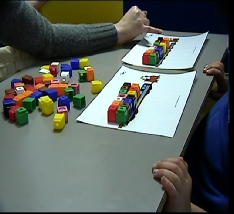

™
A Teaching Withdrawal Programme
The Turnabout Programme is a successful method of helping pupils with the characteristics of Dyslexia and Attention Deficit Disorders. At least 15% of the pupils in an average school will have one or possibly both of these characteristics.
It is not another phonics programme. The Turnabout Programme works ‘below’ the literacy level and aims to help ‘rewire’ the brain so that effective learning can take place. Turnabout activities particularly aim to develop memory; working memory, visual memory, auditory memory, memory retrieval, memory sequencing.
The Turnabout Programme is a successful method of helping pupils with the characteristics of Dyslexia and Attention Deficit Disorders. At least 15% of the pupils in an average school will have one or possibly both of these characteristics.
It is not another phonics programme. The Turnabout Programme works ‘below’ the literacy level and aims to help ‘rewire’ the brain so that effective learning can take place. Turnabout activities particularly aim to develop memory; working memory, visual memory, auditory memory, memory retrieval, memory sequencing.
Fun for the children and easy to administer
The Turnabout Programme is applied through a series of table-top activities that utilise familiar objects used in schools. The activities are fun for the children and easy to administer. The Turnabout Programme improves the child’s capacity for learning, particularly reading. Following Turnabout training traditional methods of teaching literacy skills become effective. Turnabout does not conflict with any remedial literacy programme - rather it is the catalyst that enables other programmes to be effective.
The Turnabout Programme is applied through a series of table-top activities that utilise familiar objects used in schools. The activities are fun for the children and easy to administer. The Turnabout Programme improves the child’s capacity for learning, particularly reading. Following Turnabout training traditional methods of teaching literacy skills become effective. Turnabout does not conflict with any remedial literacy programme - rather it is the catalyst that enables other programmes to be effective.
No expensive equipment needed
The programme requires no expensive specialist equipment or specialist trainers. Following a Turnabout training workshop, SENCOs successfully manage the programme and classroom assistants deliver it effectively.
The programme requires no expensive specialist equipment or specialist trainers. Following a Turnabout training workshop, SENCOs successfully manage the programme and classroom assistants deliver it effectively.
I noticed that some work was hard and when I went back to itt, it was very very easy - such as long addition, division and technical words. Now it’s easier to join in discussions in class. I now remember what the teacher has said.
More about Turnabout

I am getting better at listening in the classroom. My reading has got better. I recognise words more quickly. My writing has improved and is getting joined up. I am remembering stories better than before. My spelling is getting better. My maths has improved. Adding up is good - it was not very good before and now I can do taking away. I can work better on my own now.
Developing self-esteem
Integral to the success of the programme are the procedures for improving the self-esteem of the pupils, many of whom will have experienced little success throughout their life at school. Using a metacognitive approach, pupils are encouraged to think about their learning and their feelings. The synergy created between the cognitive activities to improve memory and other attributes and the procedures for enhancing self-esteem is an important reason why such outstanding improvements are consistently achieved and why schools using the programme have reported such significant, measurable improvements in their pupils’ learning.
Integral to the success of the programme are the procedures for improving the self-esteem of the pupils, many of whom will have experienced little success throughout their life at school. Using a metacognitive approach, pupils are encouraged to think about their learning and their feelings. The synergy created between the cognitive activities to improve memory and other attributes and the procedures for enhancing self-esteem is an important reason why such outstanding improvements are consistently achieved and why schools using the programme have reported such significant, measurable improvements in their pupils’ learning.

“
“
”
“
”
”